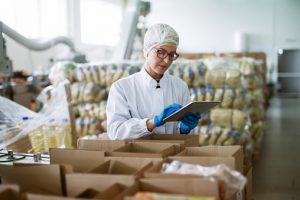Best Ideas to Avoid Injuries in the Food Manufacturing Industry
 In 2016, the Bureau of Labor Statistics (BLS) reported nearly 3 million nonfatal workplace injuries and illnesses among private industry employers. Approximately 19,740 happened in the food manufacturing industry.
In 2016, the Bureau of Labor Statistics (BLS) reported nearly 3 million nonfatal workplace injuries and illnesses among private industry employers. Approximately 19,740 happened in the food manufacturing industry.
As the population increases, so does the demand for the food manufacturing industry. This demand places increased pressure on employees to work faster and more efficiently.
As production increases, employers must find effective ways to promote employee safety, including:
- Understanding what usually causes workplace accidents
- Implementing employee safety training
- Maintaining oversight to remove or reduce workplace hazards
- Regularly offering safety tips and reminders to workers
Injuries likely to occur in food manufacturing
The most common injuries to occur in the food manufacturing industry include:
- Sprains and strains: Workers who perform repetitive and awkward motions for long stretches of time are at a heightened risk of sustaining sprains and strains. Tasks may include portioning, cutting, and operating machines and tools. The likelihood of sustaining sprains and strains can be reduced by performing warm-up exercises and stretches prior to a shift.
- Slips and falls: Slippery floor surfaces caused by spilled oil, water, and other liquids can put workers at risk of slipping and falling. These accidents often result in sprains, muscle tears, bone fractures, and lacerations. Slipping hazards can be reduced by installing nonslip flooring, requiring workers to wear non-slip footwear, and clearing debris from floors.
- Machine-related injuries: Workers who operate machinery could be at risk of coming in contact with sharp blades or having body parts stuck in a machine. This can result in serious cuts, lacerations, bone fractures, and amputations. Machine-related injuries can be reduced by implementing guards and covers on certain machine components, as well as lockout processes to prevent equipment from automatically turning on when being serviced.
Safety first
Adequate training is key for safety in the food manufacturing industry. Employers should focus on the following areas:
- How to properly use machines and tools
- How to properly cut, prepare, portion, and package food
- How to work efficiently with others to avoid accidents
- How to maintain a safe and clean workspace
- How to spot and remove hazards
Taking these precautions can only reduce the likelihood of injuries occurring on the job. Accidents happen unexpectedly, and sometimes in the safest work environments. That’s why if you been hurt at work, it’s important that you consider your legal options when pursuing a workers’ compensation claim.
The Law Offices of Deborah G. Kohl can help guide you through the process and negotiate for a fair settlement. Contact us online today to get started. Consultations are free of charge.
